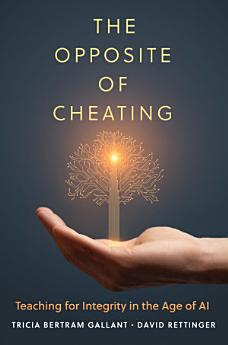The Opposite of Cheating: Teaching for Integrity in the Age of AI
Mar 2025 · Teaching, Engaging, and Thriving in Higher Ed Book 4 · University of Oklahoma Press
Ebook
276
Pages
reportRatings and reviews aren’t verified Learn More
About this ebook
In these days of an ever-expanding internet, generative AI, and term paper mills, students may find it too easy and tempting to cheat, and teachers may think they can’t keep up. What’s needed, and what Tricia Bertram Gallant and David A. Rettinger offer in this timely book, is a new approach—one that works with the realities of the twenty-first century, not just to protect academic integrity but also to maximize opportunities for students to learn.
The Opposite of Cheating presents a positive, forward-looking, research-backed vision for what classroom integrity can look like in the GenAI era, both in cyberspace and on campus. Accordingly, the book outlines workable measures teachers can use to better understand why students cheat and to prevent cheating while aiming to enhance learning and integrity.
Bertram Gallant and Rettinger provide practical suggestions to help faculty revise the conversation around integrity, refocus classes and students on learning, reconsider the structure and goals of assessment, and generally reframe our response to cheating. At the core of this strategy is a call for teachers, academic staff, institutional leaders, and administrators to rethink how we “show up” for students, and to reinforce and fully support quality teaching, learning, and assessment. With its evidentiary basis and its useful tips for instructors across disciplines, levels of experience, and modes of instruction, this book offers a much-needed chance to pause, rethink our purpose, and refocus on what matters—creating classes that center human interactions that foster the personal and professional growth of our students.
The Opposite of Cheating presents a positive, forward-looking, research-backed vision for what classroom integrity can look like in the GenAI era, both in cyberspace and on campus. Accordingly, the book outlines workable measures teachers can use to better understand why students cheat and to prevent cheating while aiming to enhance learning and integrity.
Bertram Gallant and Rettinger provide practical suggestions to help faculty revise the conversation around integrity, refocus classes and students on learning, reconsider the structure and goals of assessment, and generally reframe our response to cheating. At the core of this strategy is a call for teachers, academic staff, institutional leaders, and administrators to rethink how we “show up” for students, and to reinforce and fully support quality teaching, learning, and assessment. With its evidentiary basis and its useful tips for instructors across disciplines, levels of experience, and modes of instruction, this book offers a much-needed chance to pause, rethink our purpose, and refocus on what matters—creating classes that center human interactions that foster the personal and professional growth of our students.
About the author
Tricia Bertram Gallant is Director of Academic Integrity and the Triton Testing Center at the University of California, San Diego.
David A. Rettinger is Applied Professor and Undergraduate Program Director in Psychology at the University of Tulsa.
Rate this ebook
Tell us what you think.
Reading information
Smartphones and tablets
Install the Google Play Books app for Android and iPad/iPhone. It syncs automatically with your account and allows you to read online or offline wherever you are.
Laptops and computers
You can listen to audiobooks purchased on Google Play using your computer's web browser.
eReaders and other devices
To read on e-ink devices like Kobo eReaders, you'll need to download a file and transfer it to your device. Follow the detailed Help Center instructions to transfer the files to supported eReaders.







